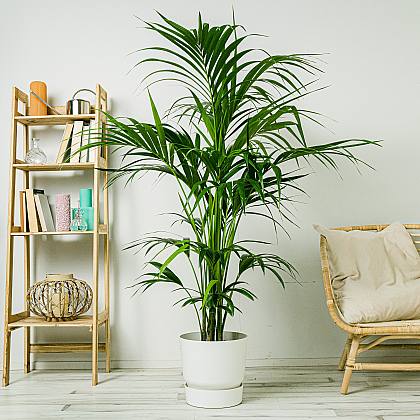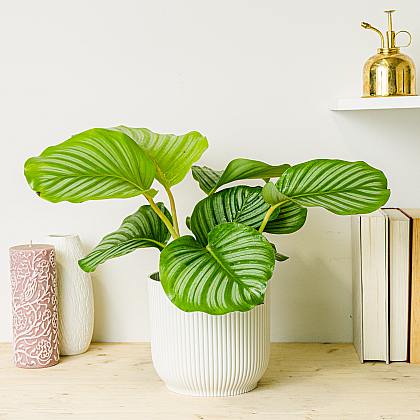Natural habitat for your animals: houseplants that will make them happy
Houseplants are not only an aesthetic addition to your home, but they can also be a natural habitat for your animals. In this article, we'll look at how houseplants can improve your pets' well-being
Houseplants are not only an aesthetic addition to your home, but they can also be a natural habitat for your animals. In this article, we'll look at how houseplants can improve your pets' well-being. We will present the best houseplants for cat lovers and dogs, as well as tips on how to choose houseplants for small animals such as rabbits and guinea pigs. In addition, we will talk about how you can enrich your reptiles' terrarium with houseplants and choose bird-friendly houseplants for a cheerful atmosphere. Lastly, we will also look at the importance of plants in an aquarium and which species are best suited.
Why houseplants are a natural habitat for your animals
Houseplants are a natural habitat for your animals for several reasons. First, they provide a similar environment to the animals' natural living environment, giving them a sense of familiarity and security. Many animals, such as cats, dogs and reptiles, feel more comfortable around plants because they provide them with shelter and retreat. Houseplants can also promote the well-being of your pets by improving air quality and creating a pleasant atmosphere. Plants produce oxygen and filter pollutants from the air, which is especially important for animals with sensitive respiratory tracts. In addition, certain houseplants can also serve as a natural source of food. For example, cats can nibble on cat grass to aid their digestion, while guinea pigs and rabbits can eat leaves from certain plants. However, it is important to note that not all houseplants are suitable for animals. Some plants are poisonous and can cause health problems if consumed. Therefore, before buying houseplants, it is advisable to find out about their compatibility with pets and, if necessary, resort to non-toxic alternatives. By incorporating houseplants as a natural habitat for your animals, you can increase their well-being and provide them with a comfortable environment.
The Best Houseplants for Cat Lovers
If you have a cat and also like to put houseplants in your house, you should make sure that they are non-toxic to your furry friends. There are many plants that not only look beautiful, but are also safe for your cat. Some of the best houseplants for cat lovers are the spider plant, catnip, valerian, and cat grass. The Spider Plant is very easy to care for and looks very decorative with its long, grass-like leaves. It is also known to have a calming effect on cats, even encouraging them to chew on it. The catnip is another great option for cat owners. This plant has a strong smell that attracts cats and often makes them rub or roll against it. Valerian is another plant that has a calming effect on cats and helps them relax. The cat grass is also very popular with cats and can help them improve their digestion and avoid hairballs. When choosing houseplants, you should always make sure that they are non-toxic and do not pose a danger to your pets.
Houseplants that promote the well-being of dogs
Houseplants can not only create a beautiful atmosphere in our home, but also promote the well-being of our dogs. There are certain plants that are particularly beneficial for our four-legged friends. One such plant is, for example, valerian. The scent of this plant can have a calming effect on dogs and help them relax. Chamomile is also a good choice, as it has anti-inflammatory properties and can help with skin irritations or minor injuries. Another plant that supports the well-being of dogs is aloe vera. Its juice has a cooling and soothing effect on sunburn or insect bites. In addition to these specific plants, generally air-purifying houseplants such as the bow hemp or the green lily can also help to improve the air quality in the house and thus increase the well-being of our dogs. However, it's important to note that not all houseplants are suitable for dogs. Some plants can be poisonous and should therefore be avoided. So before you bring new plants indoors, you should find out whether they are safe for dogs. By choosing and placing houseplants correctly, we can ensure that our dogs have a comfortable and healthy environment in which they can feel comfortable.
How to enrich your reptiles' terrarium with houseplants
Houseplants can be a wonderful addition to your reptiles' terrarium. Not only do they provide an aesthetically pleasing environment, but they can also improve the well-being and health of your animals. A popular choice for reptile keepers are plants such as bromeliads, ferns, and bamboo. These plant species create a natural environment and provide hiding places as well as climbing and sunbathing spots for your reptiles. In addition, houseplants help regulate the humidity in the terrarium, which is especially important for species that require high humidity, such as geckos or chameleons. When setting up the terrarium, you should make sure that the plants you choose are non-toxic to your reptiles. Poisonous plants can lead to serious health problems if eaten by the animals. It is also advisable to check the plants regularly and remove any dead leaves or branches to avoid possible mold growth. So, with the right selection and care of houseplants, you can transform your reptiles' terrarium into a natural and pleasant habitat that meets their needs and provides them with a happy home.
Bird-friendly houseplants for a cheerful atmosphere
Bird-friendly houseplants can help create a cheerful atmosphere in your home. There are a variety of plants that can attract birds and provide them with a pleasant home. One of the best options is flowering plants such as geraniums, petunias, and hibiscus. These plants produce nectar that attracts birds, and their flowers provide a place to rest and relax. Another good choice is trees and shrubs such as oak, maple, and lilac. These provide birds with protection from predators and can also serve as nesting sites.
Houseplants such as bamboo and palm trees are also very popular with birds, as they provide them with a place to play and hide. When choosing these types of plants, you'll want to make sure they're large enough to meet the needs of your birds.
It is important to note that some houseplants can be toxic to birds. These include plants such as oleander, azaleas, and poinsettia. Make sure you educate yourself about the poisonous plants and keep them out of the reach of your birds.
Overall, bird-friendly houseplants can help create a cheerful atmosphere in your home and provide a comfortable home for your feathered friends. However, when choosing houseplants, you should always make sure that they are safe for your birds and meet their needs.
Tips for choosing houseplants for small animals such as rabbits and guinea pigs
When it comes to choosing houseplants for small animals like rabbits and guinea pigs, there are some important tips to keep in mind. Firstly, poisonous plants should be avoided as they can be dangerous to the animals. Plants that should be avoided include, for example, ivy, oleander, and lilies. It is advisable to find out about its toxicity before buying a houseplant.
Secondly, plants with soft leaves should be preferred, as they are easier for rabbits and guinea pigs to digest. Examples of such plants are carnations, ficus and Cyprus grass. These plants also provide a good opportunity for the animals to live out their natural chewing instincts.
Thirdly, it is important to make sure that the houseplants have not been treated with pesticides or other chemical substances. These can be harmful to the health of the small animals. Instead, preference should be given to organically grown crops.
Finally, the placement of houseplants should also be taken into account. Since rabbits and guinea pigs like to nibble on everything, the plants should be placed out of their reach or placed in hanging pots.
By following these tips, you can ensure that you choose houseplants that are both safe and beneficial for the well-being of rabbits and guinea pigs. It is important to consider the needs of the animals and provide them with a natural habitat that supports their health and happiness.
The importance of plants in an aquarium and which species are best suited
Plants play a crucial role in an aquarium and help create a healthy and natural habitat for its residents. Not only do they offer aesthetic benefits, but they also have important functional aspects. Plants in the aquarium provide oxygen, absorb harmful substances such as ammonia and nitrate, and provide hiding places for fish. There are several types of aquatic plants that are particularly suitable for aquariums. For example, a popular choice is Anubias, which grow slowly and therefore require little care. They can be used in both larger and smaller aquariums and provide shelter and hiding places for the fish. Another good option is floating plants such as pennywort or shell flowers, which float on the surface of the water and can provide shade for the fish. Fast-growing plants such as waterweed or hornwort are suitable for aquariums with strong light, as they help remove excess nutrients and reduce algae growth. When choosing plants for the aquarium, it is important to consider their needs in terms of light, temperature and water quality. A balanced mix of different plant species can help create a healthy ecosystem in the aquarium and provide a natural habitat for the fish.
It's amazing to see how houseplants not only enrich our lives, but also those of our pets. Choosing the right plants can have a huge impact on their well-being and bring a piece of nature into their homes. Whether cat, dog, reptile, bird or small animal - there are suitable houseplants for every animal. But we should also be aware that not all plants are suitable for our pets and some can even be poisonous. Therefore, before buying a new plant, it is important to find out about its compatibility with animals.
As pet owners, we should strive to provide our animals with a species-appropriate environment and make them as happy as possible. Houseplants can be a great help in this regard, mimicking the natural habitat of our pets and bringing a piece of nature into their homes. But it is also important that we educate ourselves about the needs of our animals and make sure that they do not accidentally eat poisonous plants or injure themselves from them.
Considering the importance of houseplants for our pets, we should ask ourselves if we have enough of them in our home and if they really promote the well-being of our animals. Perhaps we should also ask ourselves if we are restricting our pets too much by keeping them indoors and if we are giving them enough opportunities to act out their natural instincts. An open reflection on our role as pet owners can help make our pets' lives even happier and more fulfilling


